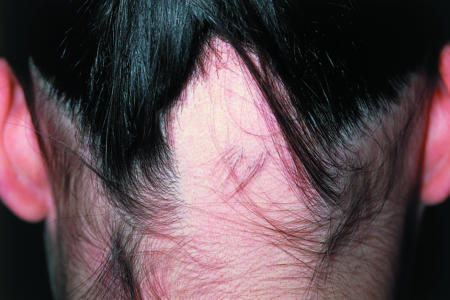Editor—Hunt and McHale conducted an extensive clinical review about the psychological impact of alopecia.1 Alopecia is psychologically damaging, causes intense emotional suffering, and leads to personal, social, and work related problems.1,2
Although stressful life events may have an important role in triggering some episodes of alopecia,1 the anxiety symptoms that follow its appearance may closely resemble social anxiety disorder. Some patients with alopecia have anxiety symptoms, avoidance behaviour, and social and economic suffering similar to social anxiety disorder patients. Social anxiety disorder is characterised by the fear of humiliation or being judged negatively in social situations as well as the avoidance of such social or performance situations.3 The diagnosis of social anxiety disorder excludes patients whose social fears and avoidance are secondary to other psychiatric disorders or medical problems (for example, essential tremor or stuttering).
Figure 1.
Patients with alopecia initially unrelated to social anxiety may begin to avoid public situations out of fear that it would be embarrassing if others observed the loss of hair, and they may experience excessive fear of being humiliated or of embarrassment when their alopecia is noticed. Identical to patients with primary social anxiety, they tend to be self conscious and self critical, and they often experience physical symptoms of anxiety, such as blushing, palpitations, sweating, and trembling. Such secondary social anxiety disorder has the same symptoms, behaviour, and consequences of the primary subtype.4 Patients with social anxiety disorder secondary to disfiguring or disabling medical conditions experience serious social anxiety and avoidance, and since such symptoms have been shown to respond to antidepressant drugs,5 controlled trials should be conducted to describe the response of secondary social anxiety and avoidance to pharmacological treatment.
Competing interests: None declared.
References
- 1.Hunt N, McHale S. The psychological impact of alopecia. BMJ 2005;331: 951-3. (22 October.) [DOI] [PMC free article] [PubMed] [Google Scholar]
- 2.Hunt N, McHale S. Reported experiences of persons with alopecia areata. J Loss Trauma 2005;10: 33-50. [Google Scholar]
- 3.Schneier F. Social anxiety disorder. BMJ 2003;327: 515-6. [DOI] [PMC free article] [PubMed] [Google Scholar]
- 4.Nardi AE. Social anxiety disorder has social and economic burden. BMJ 2003;327: 1287. [DOI] [PMC free article] [PubMed] [Google Scholar]
- 5.Nardi AE. Antidepressants in social anxiety disorder. Arq Neuropsiquiatr 2001;59: 637-42. [DOI] [PubMed] [Google Scholar]



